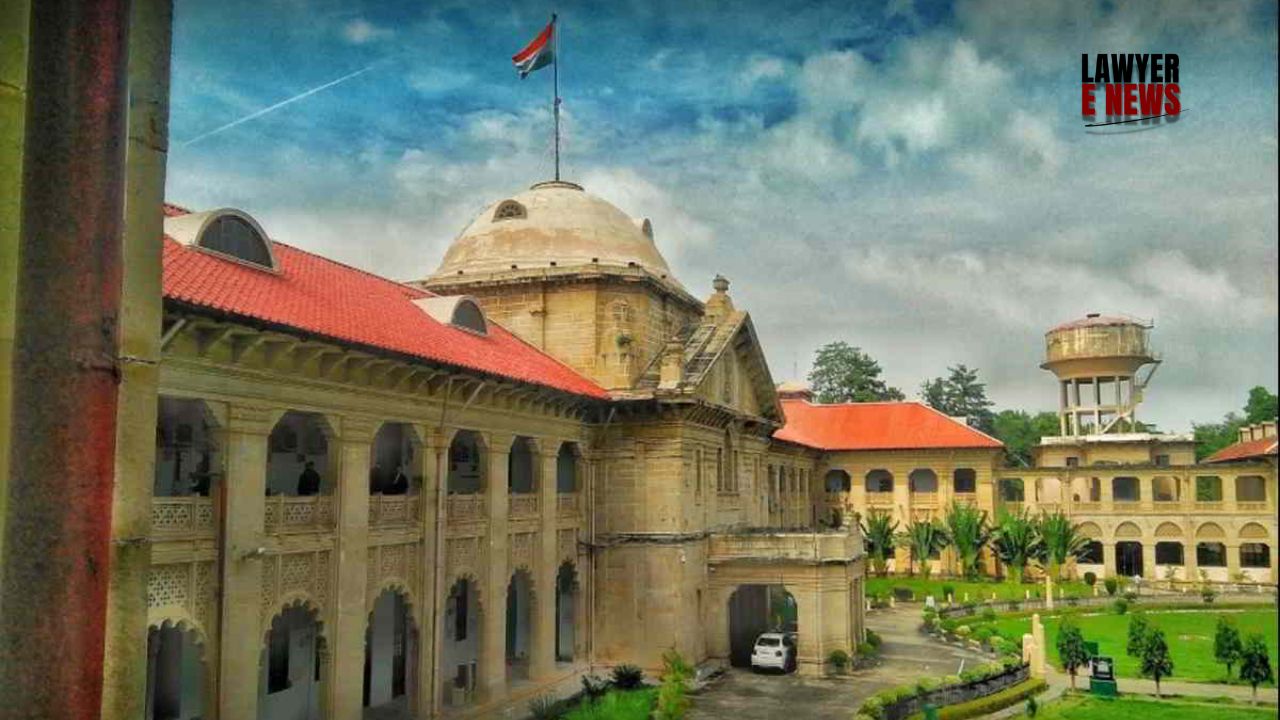-
by sayum
20 February 2026 10:40 AM



Violation of Article 300A Cannot Be Justified by Technical Pleas — Allahabad High Court quashed the possession proceedings initiated under the SARFAESI Act, holding that the procedure adopted for taking possession was fundamentally illegal. Justice Pankaj Bhatia ruled that “there is an infraction of the rights guaranteed under Article 300A of the Constitution of India, the manner of taking the possession is not in accordance with the mandate of Section 14(1-A) of the SARFAESI Act.”
The petitioner, M/S Durga Travels, had obtained a loan in 2015 for the purchase of school buses, which was later classified as a Non-Performing Asset (NPA). The secured creditor (respondent No.3-Bank) assigned its rights to respondent No.2, an Asset Reconstruction Company (ARC). Following the issuance of demand notice under Section 13(2) and possession notice under Section 13(4) of the SARFAESI Act, an application under Section 14 was moved before the ADM, Gautambudh Nagar, who allowed the secured creditor to take possession with police assistance.
The petitioner approached the Debt Recovery Tribunal (DRT) challenging the order and also submitted an OTS (One Time Settlement) proposal. Simultaneously, the DRT directed that before taking possession, at least a 15 days’ notice should be given. Despite these directions, on 25.02.2025, the ARC, allegedly with musclemen and without adherence to the statutory safeguards, took forcible possession without proper notice, presence of government officers, or compliance with the ADM's and DRT's directions.
The petitioners alleged violation of their property rights under Article 300A and challenged the action through a writ petition.
The primary issue was whether the possession of secured assets was taken in compliance with Section 14 and Section 14(1-A) of the SARFAESI Act and whether the writ petition was maintainable despite the alternate statutory remedy.
The Court clarified, “Section 14(1-A) further empowers the District Magistrate or the Chief Metropolitan Magistrate to authorize any officer subordinate to him” but observed that “there is no material on record... to suggest that the Additional Commissioner of Police can be termed as an officer subordinate to the Additional District Magistrate.”
The Court found that possession was actually taken by police officers delegated by the Additional Commissioner of Police, who is not a subordinate of the ADM. Justice Bhatia pointed out, “The possession of immovable property was taken by an officer who was delegated the authority by the Additional Commissioner of Police and the officer delegated by him are neither functionally subordinate to the Additional District Magistrate nor can be termed as an officer of the court.”
The Court categorically held, “As the possession of immovable and movable assets have been taken contrary to the mandatory provisions, I have no hesitation in holding that the remedy of issuance of a writ would be available as prima facie, there was a violation of the rights vested by virtue of Article 300A.”
The Court rejected the respondent's argument based on alternative remedy, citing the gross procedural violation involved. The Bench referred to CELIR LLP v. Bafna Motors (2024) 2 SCC 1, United Bank of India v. Satyawati Tondon (2010) 8 SCC 110, and NKGSB Co-operative Bank v. Subir Chakravarty (2022) 10 SCC 286 but distinguished them by holding that, “The present case reveals direct violation of Section 14(1-A) which goes to the root of the matter.”
It was also noted that the secured creditor not only took possession of the immovable property but also locked up and denied access to movable assets like books, medicines, and personal belongings which were not even subject to hypothecation.
The Court further held, “Even the directions of the ADM in its order dated 21.04.2023 were not complied, as no notice was ever served to the guarantors... the directions given by the DRT directing the ADM to issue at least 15 days prior notice before taking possession have also not been observed.”
Quoting ICICI Bank Ltd. v. Prakash Kaur [(2007) 2 SCC 711], the Court reminded that “violation of the supremacy of rule of law has to be deprecated, the procedure prescribed under law should be scrupulously followed which has not been done in the present case.”
The Court allowed the petition, holding that the entire possession was illegal, observing that, “Denying possession through a procedure alien to Section 14(1-A) directly violates the rights under Article 300A of the Constitution.”
Justice Pankaj Bhatia directed, “The respondent No.2 would be at liberty to take possession in accordance with law strictly in terms of the mandate of Section 14(1-A) of the SARFAESI Act,” ensuring that only authorized officers subordinate to the ADM may carry out such actions in the future.
The decision reiterates the judicial mandate that secured creditors and their agents must adhere to statutory procedure, and unauthorized possession even in execution of secured debt recovery is not immune from judicial scrutiny.
Date of Decision: 12th March 2025
